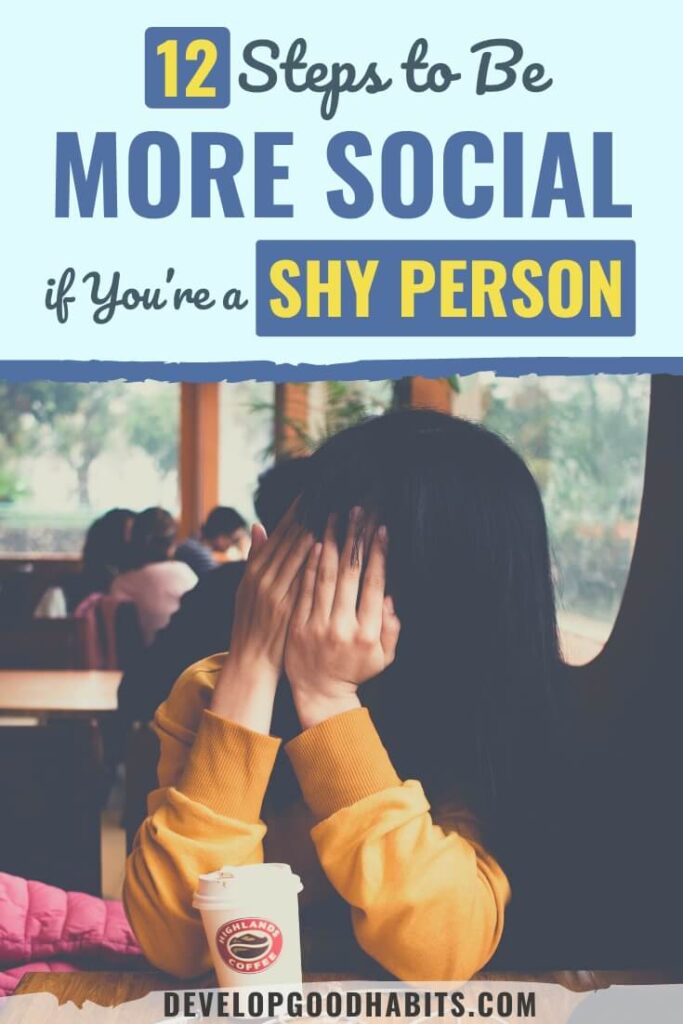Let me ask you this: Do you cringe at the thought of going to your first day at a new job, or meeting your partner’s family for the first time, or even when you are obligated to go to a professional seminar where you don’t really know anyone?
If so, you’re not alone. In fact, as many as 60% of adults report themselves as being shy. Being shy can have a negative impact on your life that goes beyond having a desolate social calendar.
It can also impact your health, career, finances, and your overall quality of life–partly due to the fact that you typically avoid social situations and rarely speak up.
The good news is that there are steps you can take to learn how to be more social if you’re shy.
I wish I was aware of these tactics back when I used to make myself look preoccupied on my phone in social situations or wondering what in the world I’m supposed to do with my hands or even spending an exorbitant amount of time in the bathroom to avoid having to talk to people.
In this article I will lay out an action plan that will teach you how to be more social. Hopefully, after going through the steps, you will be able to build your social network and become more comfortable in those formerly dreaded situations.
Let’s get to it.
How to Be More Social if You're Shy
#1. Understand what shyness is.
Any human behavior, no matter how odd it seems, is developed by your mind to reach a logical goal.
When you look at shyness objectively, it may seem to be a peculiar behavior, but when you really think about it, you will notice that it’s often used as a protective factor to avoid exposure to people who may impact your welfare in some way.
For instance, if you feel like you are unworthy compared to those around you and you have generated feelings of inadequacy, there’s a significant chance that you will be shy in social situations to protect yourself from other people that you think may recognize the fact that you’re “inferior”.
Understanding the reason behind this behavior is a critical component to conquering it. You won’t be able to overcome over your shyness until you can figure out the function that it’s trying to serve.
#2. Contemplate the source.
Develop a sense of self-awareness surrounding your shy behavior by identifying the source(s) of your feelings.
Do you feel shy all the time? Or do you really just tend to retreat in specific social situations?
Analyze the exact factors that cause you to feel nervous. If you can identify the source or trigger of your shyness, you will have something concrete to focus on.
If you have nervous tics, take a few minutes to watch the video below to learn simple ways to fix them.
For example, do you lack self-confidence? Or are you a perfectionist and you want to avoid saying something that is “wrong”? Or maybe you have a fear of people because you grew up in a dysfunctional family and you find people to be unpredictable.
If you can determine the source of your shyness, you can make an effort to alleviate the core issue, and if you can overcome that issue, your shyness–which is a symptom of the root cause–will dissipate.
#3. Take baby steps.
It is best to face your social fears gradually, starting with mildly stressful situations and building up to scenarios that feel increasingly intimidating.
Think of it like climbing a mountain, with each phase being a little more challenging than the last. Once you have surpassed each step, you can move onto the next one. For instance, if you’re really nervous to approach new people at a social gathering, here are some baby steps you can take:
- When you’re at a social gathering, ask someone a simple question like “Do you know where the bathroom is?” After they answer, just say thank you and leave it at that. The personal interaction can be short and to the point.
- Ask one of your friends to introduce you to someone that they know and help spark a conversation among the three of you.
- Find someone who is not currently in a conversation with anyone and introduce yourself. Ask them who they know at the party and see if you know any people in common.
- Situate yourself in a group of people who are already talking and start to engage in the conversation. Even if you’re just listening and nodding along, that’s fine, but try to make a comment as well.
- Join a group that seems approachable and become active in their conversation.
#4. Practice active listening.
Just because you prefer to not talk to people unless it’s absolutely necessary, this doesn’t mean that people don’t want to talk to you. People love to talk about themselves. If you’re nervous that everything you say to someone won’t be just right or you’re lacking self-confidence, lend a listening ear.
Something interesting happens when you take the time to listen to other people–they will just keep on talking.
This is especially true if you show interest in what they’re saying, because oftentimes, it’s hard to find someone who is willing to give you their full attention.

In fact, research shows that people only pay attention to 25-50% of what someone else is telling them. This means that if you are able to express interest that the speaker doesn’t usually obtain from others, they will feel inspired to keep talking.
This means you should make eye contact with people, ask clarifying questions about what they’re telling you, ignore whatever else is going on around you, maintain an open posture, and nod along with what they’re saying.
Active listening is an instant technique that you can use to establish both trust and likeability. It will also help you understand the person and get to know them a bit, which will probably help you feel more comfortable in their presence. If this is the case, you’ve just added another person to your social network.
And, you know what? No one really expects you to talk a lot anyway. Rambling on and on has nothing to do with fitting in. Just sit back and follow along with the conversation. If you have something to say, go ahead and speak up without analyzing how it might sound.
#5. Smile.
If you’re not naturally a “smiley” person, making an effort to smile more frequently may feel weird at first. However, smiling when you first meet someone will give off that valuable good first impression.
By making a good first impression with a genuine smile, you will also be making a memorable impression–and being memorable is an important part of building your social network.
You want others to be able to put your face to your name, and people tend to remember those who seem legitimately happy to meet them. And because we like people who like us, showing that you enjoy or appreciate someone through your smile is an effective way of making friends.
Experiment with smiling at people whom you’ve never met. Chances are, if you have the opportunity to interact with that person, you will connect with them in a way that will lay the foundation for a solid friendship.
#6. Create small, attainable goals to conquer your shyness.
This is different from #3 (taking baby steps) because these are goals that can be worked on every day in a variety of situations. When you walk into work in the morning, do you say “good morning” to everyone that you see, or do you pass them in silence?
If you avoid acknowledging people that you see on an everyday basis, give yourself the challenge of coming into work and greeting the people that you come across. After you do this for a while, it will become second nature and it will increase the level of comfort you have around your colleagues.
Another small goal in the workplace that you can make to help overcome your shy tendencies is to get up and go to your supervisor’s (or a colleague’s) office if you have a question.
You’re probably used to shooting someone an email or setting a reminder to ask that person the next time you run into each other, but being proactive about seeking people out to have a conversation can be good practice.
Finally, if you’re in close proximity to someone, whether it’s at the self-serve station at the coffee shop or in the break room at work, instead of delicately tip-toeing around them–or even waiting from a distance for them to leave–make an effort to ask how their day is going or initiate another short conversation that will increase the amount of interaction you have with people that day.
These are just a few examples, but there are a lot of small goals you can make to help you become more comfortable with being social. Give people compliments or ask them what their summer plans are. It won’t take much time for these habits to become second nature.
#7. Use social media.
If you're shy when you’re around people, you can practice interacting with others by working on your social media presence. You can get to know someone by using a social media platform and become comfortable talking to new people.
Now, this is not a replacement for face-to-face social interaction. However, using social media is a good way to start talking to the people that you’re interested in. You can also find and talk to people that you have things in common with.
For instance, let’s say you love gardening. Join an online group that focuses on gardening and get to know the people in it. Not only can you build relationships by doing this, you can also learn some new techniques for your hobby.
If you're looking to meet new people, here are some hobbies that can widen your social circle. And here's a list of hobbies introverts might like.
#8. Be prepared with icebreaker topics or stories.
The thought of coming face-to-face with a complete stranger can be intimidating, but if you have some ideas stored up on how to break the ice, it can be a lot easier. You can ask someone what brought them to [wherever you are] that day or if they’re originally from around town.
Treat strangers like they are friends that you just haven’t seen in a while. If they seem to be willing to engage in conversation, ask them what they like to do in their free time or if they have any exciting plans coming up.
Alternatively, when you have a couple of stories to share with other people, you’ll always be equipped with a conversation starter. This could be something funny that happened to you in the past or even a story that makes you a bit vulnerable.

People will appreciate your willingness to be unguarded and this will help build a sense of trust. If you’re open about your vulnerabilities, it will offer an opportunity to have a bonding experience, especially if you’re able to laugh at yourself.
#9. Set a goal to meet at least 3 new people at every event.
Whether you’re going to a party where you don’t know many people or you’re going to a business event, make a firm goal of meeting (and talking to) at least 3 new people.
This is better than promising yourself that you will “meet as many people as you can” because it is a firm number that will motivate you to be proactive in talking to people, rather than a vague goal that could result in meeting zero people.
Get fully engaged in each conversation that you have before moving onto the next one by asking open-ended questions that can lead to other topics.
Focusing on this goal of meeting at least 3 new people will also divert your attention from your anxiety and help you concentrate on your progress. This will also give you an opportunity to leave if you want to once you've hit your goal.
#10. Come with a back-up plan.
If someone has invited you to some sort of gathering and the only thing that is keeping you from going is the thought of having to mingle with other people, show up with a plan that will allow you to leave if you find that the social pressure is too much for you to handle.
Accept the invitation, but tell the host that you might not be able to stay the whole time because you’re expecting a call from your [mom, boss, friend] who may need help with something.
This way, you can leave at any point if you want to, or if you find that you’re having fun, you can stay the whole time. Either way, you will know that you tried and you showed up, and that’s progress in itself.
#11. Realize that people aren’t thinking about you.
That isn’t meant to sound mean, but it’s true. At least people aren’t thinking about you to the degree that you probably imagine. Most people are too focused on themselves to really notice much about other people around them.
Just like your focus is on yourself and you’re not judging the people around you, they likely aren’t taking the time to judge you either. So don’t assume that the people around you are fixated on you, trying to form their opinion.
Remember that you’re your own worst critic, and you’re tough on yourself in a way that you wouldn’t be to other people.
Also, people are tolerant. While you may think that doing or saying something “wrong” in public is appalling and everyone will judge you, the truth is, it’s extremely unlikely that anyone would make a big deal over your social blunder.
Everyone has made a social error at some point, so the majority of people will simply overlook it and move on. Once you realize that people aren’t scrutinizing your every move, you’ll consequently feel less socially anxious.
#12. Fake it ‘til you make it.

Think of the most confident, outgoing person that you know. Or, pretend like you’re an actor when you’re faced with an opportunity to make new friends. Basically, you want to pretend that your confidence is absolutely unprecedented.
This will feel weird at first–and maybe a bit uncomfortable–but to be honest, everything on this list requires you to step outside of your comfort zone a bit.
But if your goal is to become more social and make more friends, you’re going to need to get comfortable with being uncomfortable for a while. It won’t be long before you realize that people are almost always receptive to others who are trying to engage in conversation with them.
Plus, you never know, the person with whom you strike up a conversation may actually be even more shy than you are, so you could be helping them out with their social skills as well. If you can fake confidence now, the actual confidence will follow.
Final Thoughts on How to Be More Social
Your shy tendencies do not define your personality, they’re just an obstacle that is standing in your way to growing your social network. Identify the specific situations that cause you to be shy and focus on the things you can do to remedy that.
However, don’t just fixate on the things that you need to improve–think about your strengths. Just because you tend to be detached from social situations doesn’t mean that you have nothing to offer other people. Consider your listening skills or observations skills that allow you to help other people feel understood.
Really, no one is born with social skills. This is something that is learned with time and experience, and you can silence your own self-critical beliefs, improve your self-esteem, and learn to interact with other people with confidence.
By following the steps laid out in this article, you can overcome your feelings of social awkwardness and enjoy more fulfilling relationships.
And if you're looking for more resources to help you develop your social habit, check out these articles:
- 11 Steps to Stop Being Shy, Quiet & Awkward in Social Situations
- 13 Printable Social Skills Worksheets & Templates
- 11 Ways to Improve Your Interpersonal Communication Skills

Connie Stemmle is a professional editor, freelance writer and ghostwriter. She holds a BS in Marketing and a Master’s Degree in Social Work. When she is not writing, Connie is either spending time with her 4-year-old daughter, running, or making efforts in her community to promote social justice.


